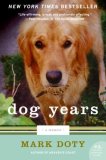Summary | Excerpt | Reviews | Beyond the Book | Readalikes | Genres & Themes | Author Bio

Critics' Opinion:
Readers' Opinion:
First Published:
Mar 2007, 224 pages
Paperback:
Apr 2008, 256 pages
 Book Reviewed by:
Book Reviewed by:
BookBrowse Review Team
Buy This Book
Chapter One
No dog has ever said a word, but that doesn't mean they live outside the world of speech. They listen acutely. They wait to hear a term—biscuit, walk—and an inflection they know. What a stream of incomprehensible signs passes over them as they wait, patiently, for one of a few familiar words! Because they do not speak, except in the most limited fashion, we are always trying to figure them out. The expression is telling: to "figure out" is to make figures of speech, to invent metaphors to help us understand the world. To choose to live with a dog is to agree to participate in a long process of interpretation—a mutual agreement, though the human being holds most of the cards.
What the interpreter must do is tell stories—sometimes to the dog in question. Who hasn't heard a dog walker chattering away to her pet, as if she were serving as a kind of linguistic mirror: "You are scared of that police horse," "Lola loves that ball!" Some people speak for their dogs in the first person, as though the dog were ventriloquizing his owner. There's inevitably something embarrassing about this; a kind of silly intimacy that might seem sweet at home becomes a source of eye-rolling discomfort to strangers.
But most stories about dogs are narrated to other people, as we go on articulating the tales of our animals' lives, in order to bring their otherwise incomprehensible experience into the more orderly world of speech. Taking pictures of your pet serves much the same function; it isn't just about memory and the desire to record, but a way to bring something of the inchoate into the world of the represented. This is a part of the pet owner's work. In order to live within the domestic world, the dog must be named, read, and in some way understood.
Of course, listening to stories about other people's pets is perilous, like listening to the recitation of dreams. Such reports may be full of charm for the dreamer, but for the poor listener they're usually fatally dull. The dreamer has no distance from the spell of the dream, and cannot say just how it mattered so, and language mostly fails to capture the deeply interior character of dreams anyway. We listen with an appreciation for the speaker's intent, but without much interest in the actual story.
Love itself is a bit like that: you can describe your beloved until the tongue tires and still, in truth, fail to get at the particular quality that has captured you. We give up, finally, and distill such feelings into single images: the bronzy warmth of one of his glances, or that way of turning the head she has when she's thinking and momentarily stops being aware of other people. That, we tell ourselves, stands for what we love. But it's perfectly clear that such images explain nothing. They serve as signposts for some incommunicable thing. Being in love is our most common version of the unsayable; everyone seems to recognize that you can't experience it from the outside, not quite—you have to feel it from the inside in order to know what it is.
Maybe the experience of loving an animal is actually more resistant to language, since animals cannot speak back to us, cannot characterize themselves or correct our assumptions about them. They look at us across a void made of the distance between their lives and our immersion in language. "Not a single one of his myriad sensations," wrote Virginia Woolf of Elizabeth Barrett Browning's cocker spaniel, Flush, "ever submitted itself to the deformity of words."
Maybe they remind us, in this way, of our own origins, when our bodies were not yet assumed into the world of speech. Then we could experience wordlessly, which must at once be a painful thing and a strange joy, a pure kind of engagement that adults never know again. Can it even be called "painful" or a "joy," if the infant who is feeling those things has no terms for them, only the uninterpreted life of emotion and sensation? We suffer a loss, leaving the physical world for the world of words—even though we gain our personhood in the process.
The foregoing is excerpted from Dog Years by Mark Doty. All rights reserved. No part of this book may be used or reproduced without written permission from HarperCollins Publishers, 10 East 53rd Street, New York, NY 10022





The Funeral Cryer by Wenyan Lu
Debut novelist Wenyan Lu brings us this witty yet profound story about one woman's midlife reawakening in contemporary rural China.
Your guide toexceptional books
BookBrowse seeks out and recommends the best in contemporary fiction and nonfiction—books that not only engage and entertain but also deepen our understanding of ourselves and the world around us.